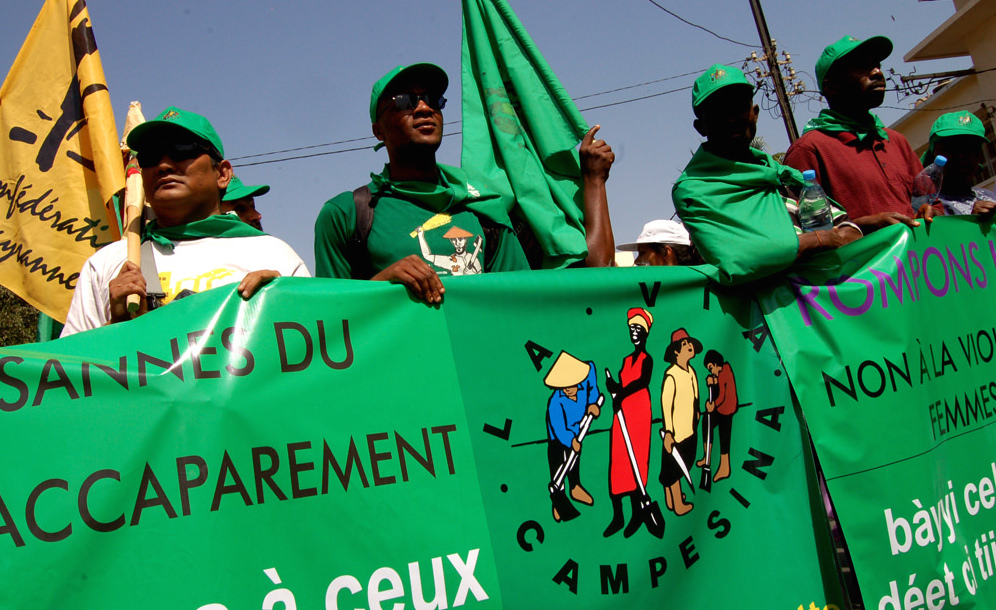It’s nice to end a year and begin a new one on a high note. That is what international small farmers’ coalition La Via Campesina and its supporters are doing following a landmark declaration by the United Nations this week.
On December 17, the 73rd Session of the United Nations General Assembly (UNGA 73) in New York adopted the UN Declaration on the Rights of Peasants and Other People Working in Rural Areas (UNDROP).
It has taken more than 17 years of diligent work on the part of La Via Campesina and supporting organizations to get to this historic moment. Just as the Universal Declaration on Human Rights shed light on human rights abuses across the globe when it was adopted in 1948, this Declaration on the Rights of Peasants will increasingly advance the issues faced by small farmers and rural people around the world, including in Canada.
The declaration is an international legal instrument that will be used by La Via Campesina (LVC) and its allies, represented by the National Farmers Union in Canada, to mobilize support for sustainable agriculture, climate, and food issues, regionally and nationally.
We all stand to benefit from the declaration, which will enable the agro-ecological movement to implement policies to protect seeds and the environment, mitigate climate change, and address land concentration, land grabbing and access to land by small farmers, as well as the right to health and food. Policies to improve food security and food sovereignty are high on the agenda of the over 250 million farmers and peasants represented by La Via Campesina’s 81 member organizations. The hope is that by leveraging this declaration, La Via Campesina and its supporters will be able to push for policies that protect small landowners and improve the lives of rural people more generally.
The 123 countries (out of 193) that voted in favour of the declaration represent three-quarters of the world’s population. The eight governments that voted against the UNDROP represent only slightly more than six per cent. And while 54 countries abstained from the final vote — including Canada — these countries make up less than 20 per cent of the world’s population. Many abstentions were likely due to pressure from the United States and agribusiness multinationals. With time, and increasing popular support and pressure, many countries will need to reconsider their position.
The declaration includes more than two dozen clauses, including some of the groundbreaking ones below:
Article 17 — Right to food
Article 18 — Right to decent income and livelihood
Article 19 — Right to land and other natural resources
Article 20 — Right to a safe, clean and healthy environment
Article 21 — Right to means of production
Article 22 — Right to seeds
Article 23 — Right to biological diversity
Article 24 — Right to water and sanitation
“These rights must be recognized and protected — and urgently,” said Jessie MacInnis, member of the National Farmers Union International Program Committee who attended the UN General Assembly to witness adoption of the declaration.
“Multinational corporations and capitalist ventures are pushing forward their agendas with no acknowledgement of the peoples they disperse or the land they remove from food production. These unsustainable actions threaten long-held knowledge of traditional seeds, lands and farming practices, and are causing a hunger crisis among many smallholders.”
The adoption of the UNDROP will, it is hoped, eventually make a difference to family farmers here in Canada as well. With clauses that protect biological diversity and the right to seed, issues like the use of terminator seed or the planting of genetically modified crops or the patenting of genetic material more generally could well be challenged. The clauses on the right to land for small landholders could well be leveraged to highlight the issue of young farmers — the young agrarians — who are trying to access land for their small farm operations. Could the clause outlining the right to a healthy environment eventually be leveraged to challenge Monsanto’s use of Roundup or Roundup Ready seed stock here in Canada? And what of the right to a decent income for farmers — another clause that the declaration clearly notes is a fundamental right of small farmers everywhere? Might there come a day when the declaration is used to show that small Canadian farmers deserve a decent income for themselves and their families? Could implementation of the declaration here in Canada help stem the loss of family farmers and begin the process of rural revitalization and re-population?
Only 17 years ago the adoption of the UN Declaration on the Rights of Peasants was a dream. Now it is a reality! The articles included in UNDROP and their implementation region by region across the globe is now also a dream — a dream for now — leaving us to wonder where we might be in 17 years — or in 70!
Lois Ross is a communications specialist, writer, and editor, living in Ottawa. Her column “At the farm gate” discusses issues that are key to food production here in Canada as well as internationally.
Photo: El Fondo Andaluz de Municipios para la Solidaridad Internacional/Flickr
Help make rabble sustainable. Please consider supporting our work with a monthly donation. Support rabble.ca today for as little as $1 per month!





